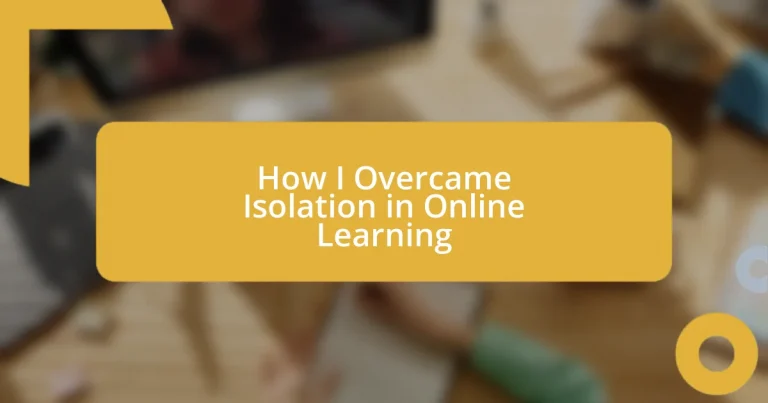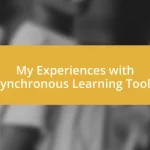Key takeaways:
- Isolation in online learning can lead to disconnection and anxiety, but acknowledging these feelings is the first step toward overcoming them.
- Building connections with peers through informal interactions and collaborative study sessions fosters a sense of community, motivation, and diverse perspectives.
- Sharing personal success stories and celebrating small achievements among classmates creates a supportive environment that mitigates feelings of isolation.
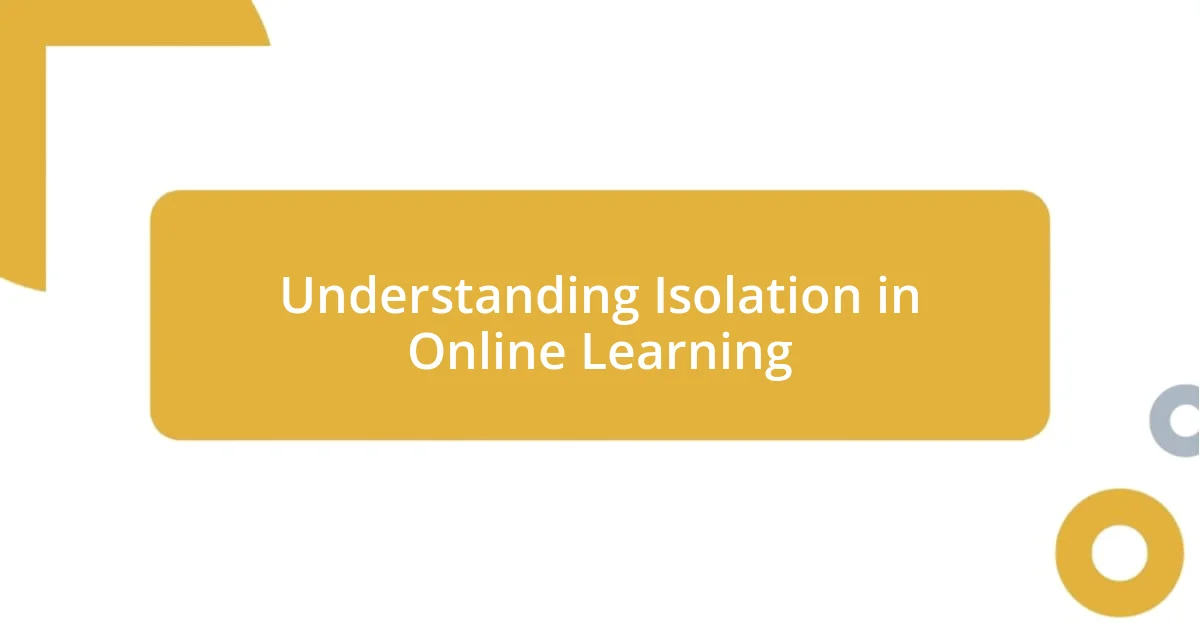
Understanding Isolation in Online Learning
Isolation in online learning can often catch us off guard. When I first transitioned to this format, I was shocked by how disconnected I felt from my peers. I found myself staring at screens for hours, without the vibrant exchanges and camaraderie that come with in-person classes. Have you ever felt that emptiness in a virtual classroom?
It’s interesting to realize that this isolation can stem from more than just the absence of physical presence. I recall moments when I struggled to form connections, even during group projects. The lack of body language cues and spontaneous conversations left me feeling like a spectator in my own education. How can we truly engage when our interactions are mediated by screens?
Moreover, this isolation can exacerbate feelings of anxiety. I remember one late-night study session when the weight of loneliness felt almost unbearable. I kept asking myself, “Am I the only one grappling with this?” It was a tough revelation, realizing that many of us shared this unspoken burden, yet everyone seemed to be managing just fine. Understanding these complexities is crucial because acknowledging our feelings can be the first step toward overcoming them.
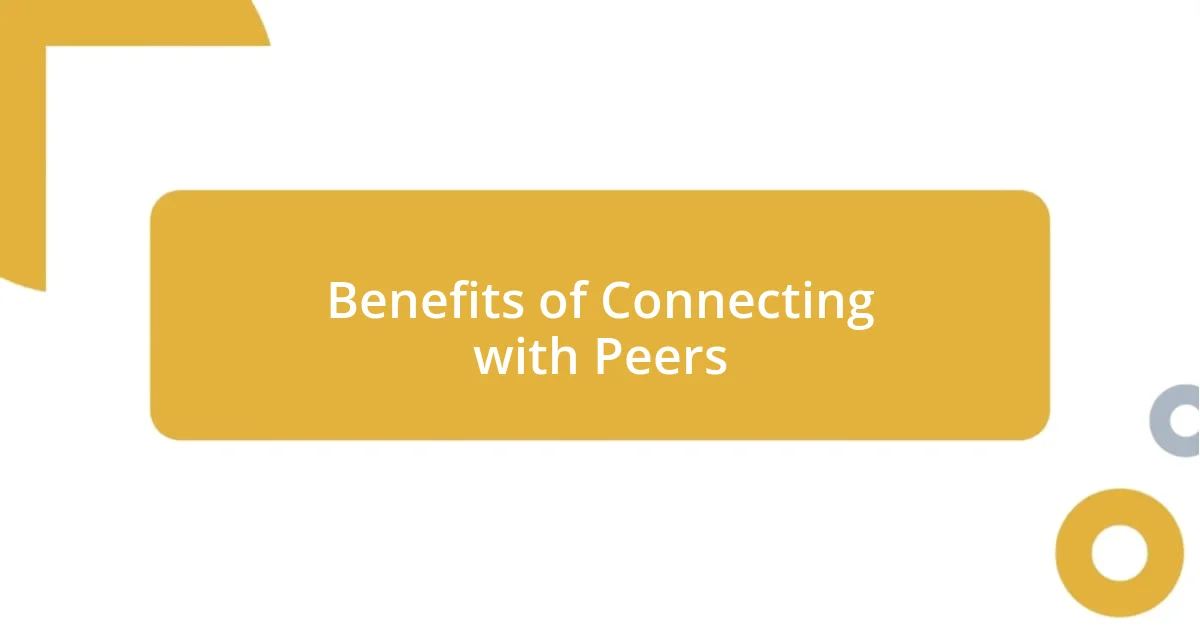
Benefits of Connecting with Peers
Connecting with peers in an online learning environment can significantly enhance our educational experience. I remember the first time I reached out to a classmate for help on a tough assignment. What surprised me was not just the assistance I received but the sense of camaraderie that emerged from our conversation. It was as if a weight lifted off my shoulders. Suddenly, I wasn’t just another face on a screen; I was part of a community sharing struggles and triumphs.
In my experience, these connections also fostered a sense of accountability. When I formed study groups with my peers, I felt more motivated to engage with the material. Have you ever noticed how you can push each other to reach your goals? I can recall nights spent collaborating over Zoom, where we’d laugh, share insights, and support one another. The energy in those sessions was palpable, transforming what could have been solitary study hours into vibrant exchanges.
Additionally, sharing our experiences allows for diverse perspectives that enrich our understanding of the subject matter. During discussions, I often found myself surprised by how differently others approached the same problem. These interactions not only deepened my comprehension but also sparked a curiosity to explore ideas beyond my own. It’s a beautiful reminder of how connected learning can be—turning our isolated experiences into a collective journey.
| Benefits of Connecting with Peers | Personal Insights |
|---|---|
| Emotional Support | Feeling part of a community |
| Increased Motivation | Accountability through collaboration |
| Diverse Perspectives | Broadened understanding of topics |
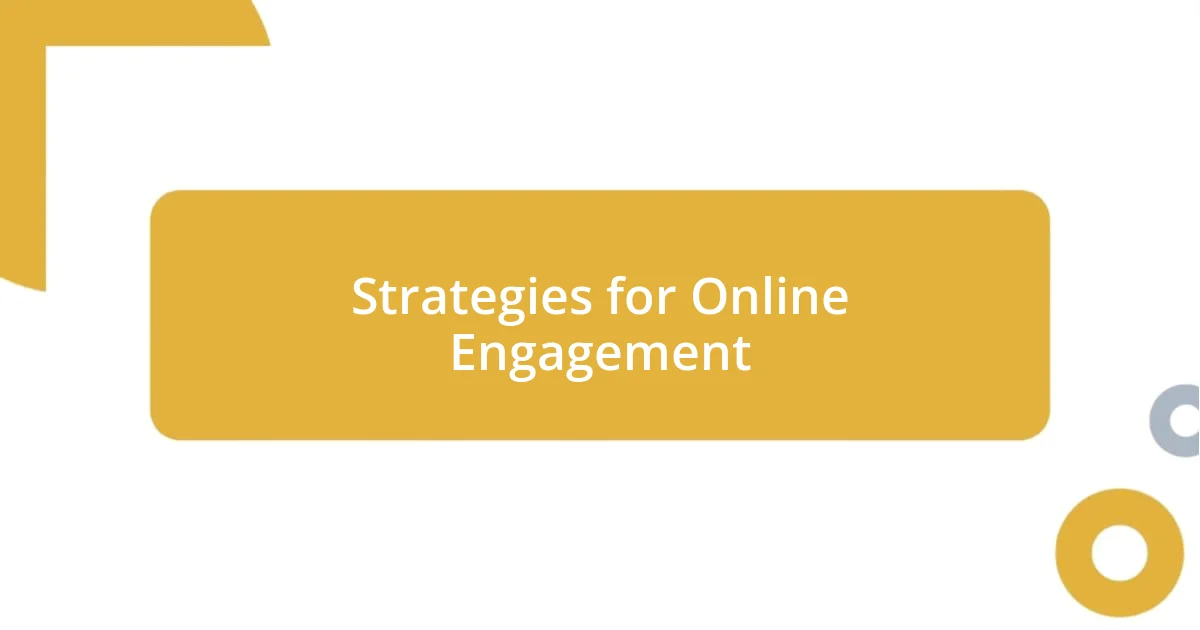
Strategies for Online Engagement
Navigating online engagement can sometimes feel daunting, but I’ve discovered several strategies that truly foster connection. For instance, I started initiating casual “virtual coffee breaks” with classmates. These informal meetings made a world of difference, allowing us to chat about life beyond academics and genuinely connect.
- Schedule regular check-ins with classmates to discuss non-academic topics.
- Participate actively in discussion boards to share thoughts and reactions to course materials.
- Create small study groups to collaborate on assignments and exchange ideas.
- Personalize communication by using voice messages or video calls instead of just text.
Another technique that has significantly boosted my engagement involves incorporating interactive tools into study sessions. I remember one particularly impactful session where we used online quizzes and polls to make learning more dynamic. The laughter and competition transformed our typical routine into a lively activity, and it felt like we were actually in a classroom together.
- Utilize platforms like Kahoot! or Quizlet to create engaging quizzes.
- Host virtual game nights centered around course topics for a fun twist.
- Incorporate collaborative tools like Google Docs to brainstorm together in real-time.
- Encourage creative presentations that allow everyone to showcase unique perspectives.
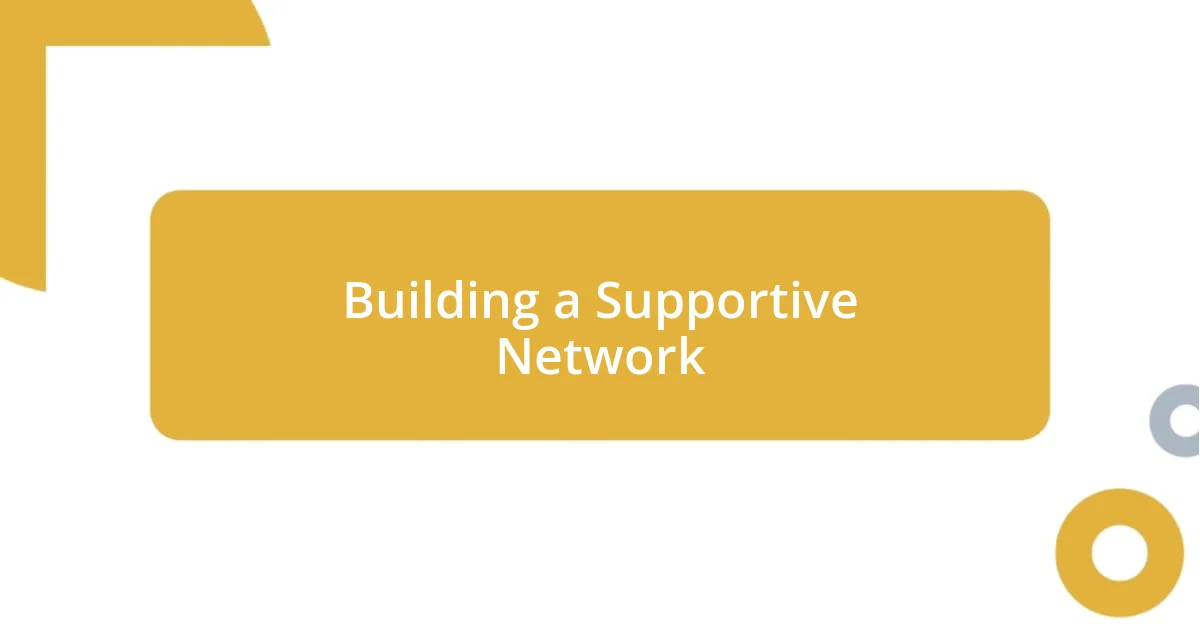
Building a Supportive Network
I truly believe that fostering a supportive network can be a game-changer in online learning. I vividly recall when I joined a dedicated social media group for my course. At first, it felt a bit overwhelming, but as I engaged more with my peers, I found a treasure trove of resources, encouragement, and friendships. It was a simple post asking for feedback on a project that opened the floodgates. People responded with thoughtful suggestions, and just like that, I was no longer navigating this journey alone.
Building connections takes time, but sharing small moments can create lasting bonds. I once hosted a virtual game night, just to lighten the mood before finals. The shared laughter and friendly banter were unforgettable. It may seem trivial to some, but those connections translated into a support system when we really needed it—especially during stressful times. Have you had an experience that turned a classmate into a friend? I certainly did, and it transformed my learning experience.
The beauty of a supportive network lies in its diversity. I remember being part of study groups where each member brought unique viewpoints to the table. One friend had a knack for visual learning; another was great at breaking down complex ideas. Those sessions taught me to appreciate different learning styles and to embrace collaboration. Isn’t it fascinating how much we can learn from each other? Through these interactions, I discovered that knowledge isn’t just accumulated; it’s shared and enriched within a community.
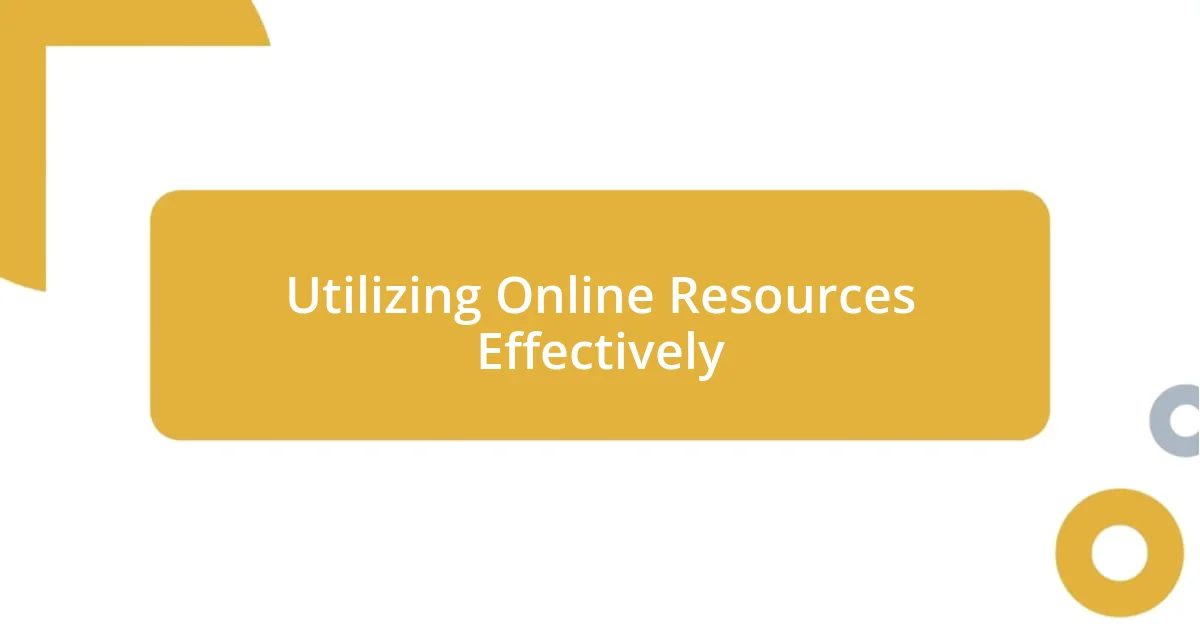
Utilizing Online Resources Effectively
In my experience, effectively utilizing online resources means diving into sources beyond the standard course materials. I started exploring educational platforms like Coursera and Khan Academy, which offered a more hands-on approach to subjects I found challenging. It felt empowering to supplement my learning with diverse perspectives, and I noticed a real growth in my understanding of complex topics.
One of my favorite strategies was creating a digital resource folder, where I compiled articles, videos, and podcasts that resonated with me. It became a personalized treasure trove of knowledge that I revisited frequently. Have you ever experienced the joy of discovering a resource that just clicks for you? I still remember listening to a podcast episode that perfectly explained a concept I was struggling with—it felt like a lightbulb moment. That sense of connection to the material made all the difference in my motivation.
Additionally, I found that participating in online webinars not only expanded my knowledge but also fostered a sense of community. I attended one particularly engaging session on time management, which included breakout discussions with strangers who quickly became friends. Sharing tips and experiences with them made me realize we were all navigating similar challenges. Have you had such moments where collaboration transforms a lecture into a lively dialogue? Those interactions were a breath of fresh air amid the isolation of online learning.
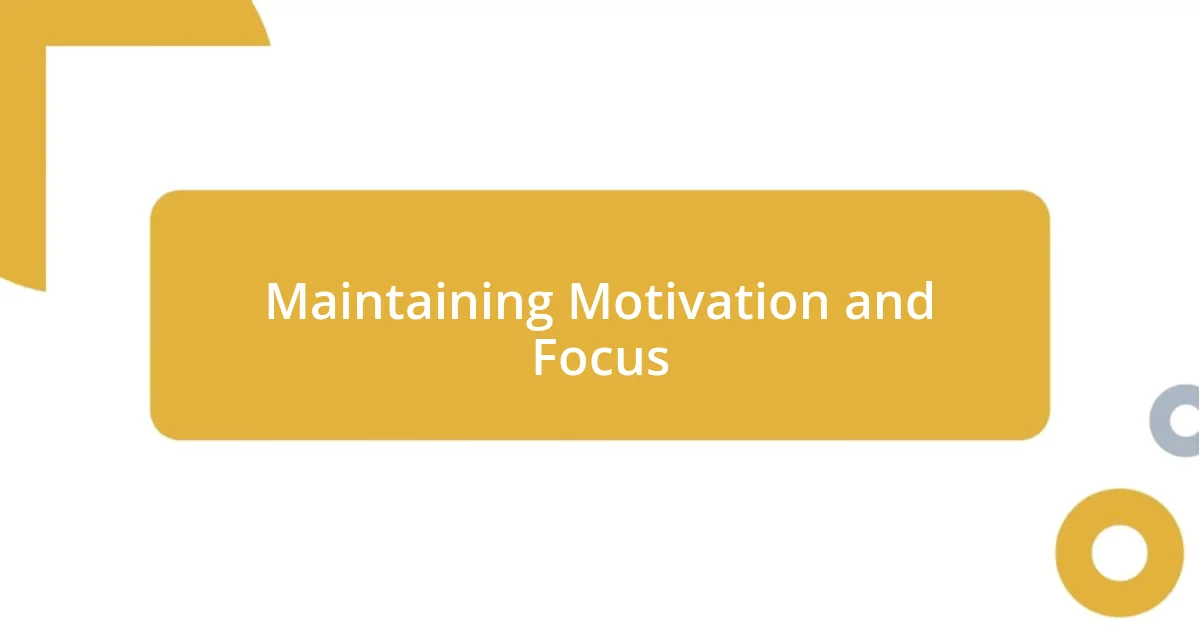
Maintaining Motivation and Focus
Maintaining motivation during online learning can be incredibly challenging, but I’ve found that setting clear, attainable goals is crucial. When I started my online courses, I made a simple goal chart—just a handful of tasks for each week. Whenever I checked something off, I felt a rush of accomplishment that kept me pushing forward. Have you ever felt that same surge when you complete a task? It’s a powerful motivator.
One of the techniques that helped me stay focused was creating a dedicated study space. I transformed a small corner of my room into a cozy study nook, complete with my favorite plants and inspiring quotes. Every time I sat there, it felt like my brain clicked into ‘study mode.’ It’s amazing how our environment can shape our mindset. Have you tried reshaping your space to boost your concentration? I truly believe it made all the difference in my productivity.
Moreover, I learned to embrace the power of scheduled breaks. During those long study sessions, I made a point to step away every hour, even if just for a few minutes. I sometimes went outside for fresh air or made a cup of tea, giving myself permission to recharge. This simple routine not only prevented burnout but also enhanced my focus when I returned to my work. Isn’t it ironic how a bit of time away can lead to greater productivity? I discovered that balance is key to lasting motivation.
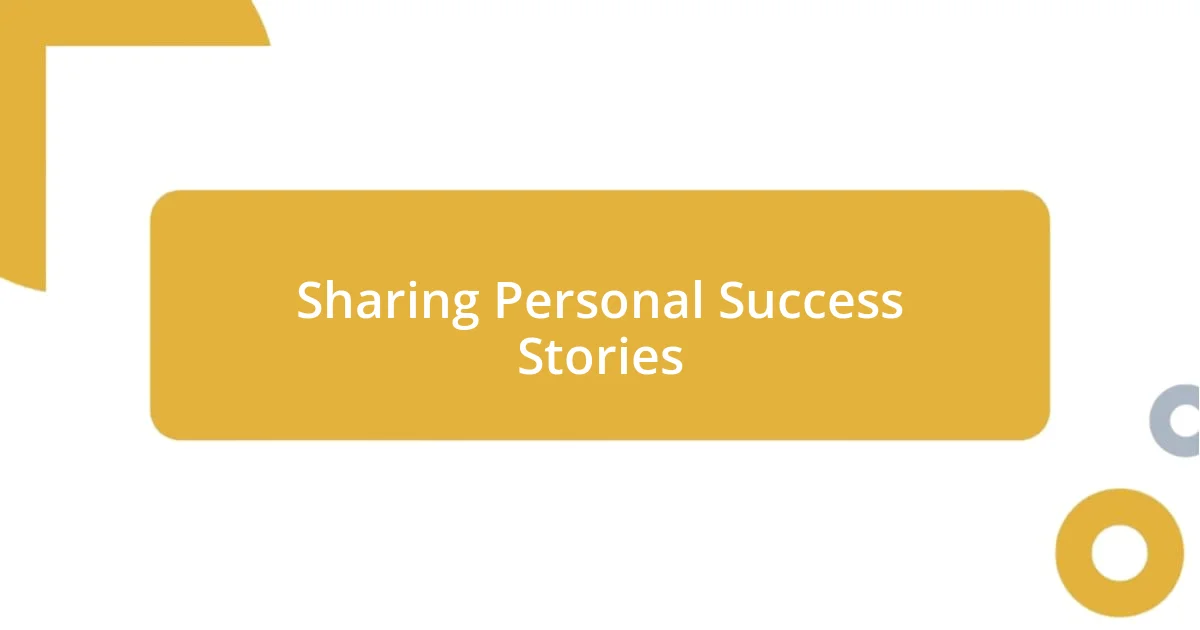
Sharing Personal Success Stories
Sharing personal success stories can be a game-changer in combatting feelings of isolation during online learning. When I decided to share my own journey in a virtual study group, the response was incredibly uplifting. I vividly remember opening up about a tough subject I’d been grappling with—suddenly, peers began to chime in, sharing their struggles and tips. Have you ever felt that rush of connection when realizing you’re not alone in your challenges? It was an eye-opening moment for all of us.
One time, I wrote a heartfelt post about overcoming procrastination that resonated with many of my classmates. The sheer number of responses made me feel seen and supported, and it prompted a lively discussion. Many shared their own tactics, which inspired me to adopt new strategies too. Isn’t it fascinating how a simple story can bring a community together? It’s almost magical to see how vulnerability can transform a group dynamic, fostering deeper connections among us.
Additionally, I started a weekly “success highlight” segment within our study group. Each week, one member would share their achievement, no matter how small. I’ll never forget the joy in my friend’s voice when she spoke about acing a quiz after struggling for weeks. That moment reminded us all that progress, no matter how incremental, is worth celebrating. How rewarding is it to witness others shine? It reinforced my belief that we all thrive when we uplift each other, and that sense of camaraderie helped to lessen the isolation we often felt.












